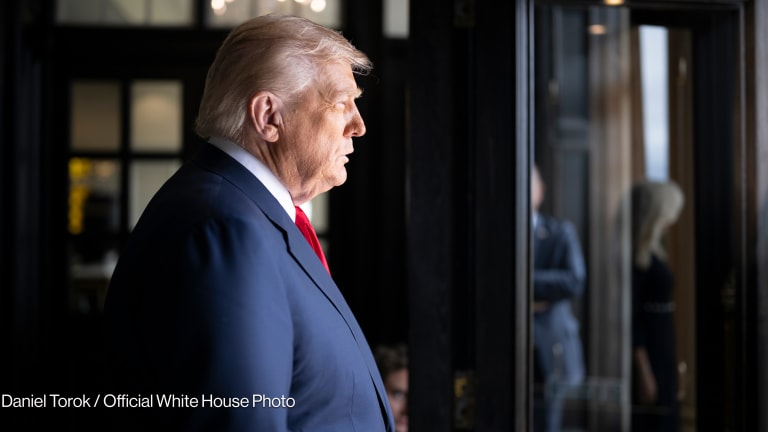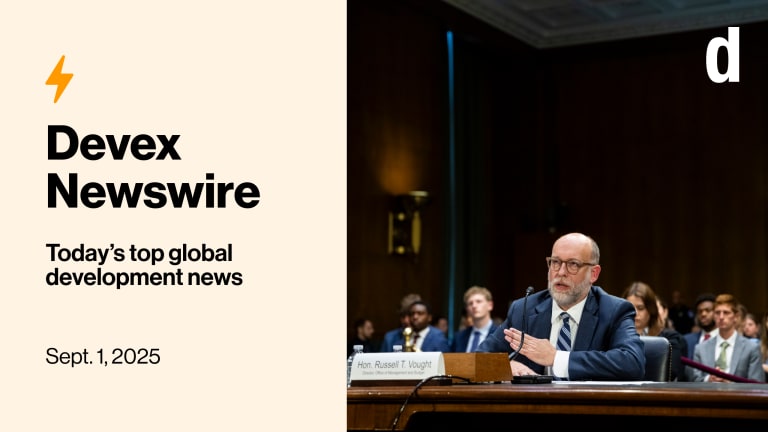
President Donald Trump calls for a major reduction in U.S. foreign aid spending, Tedros Adhanom Ghebreyesus scores a historic win at the World Health Organization, and the African Development Bank looks to India. This week in development.
President Donald Trump released his budget proposal this week, calling for deep cuts to U.S. foreign aid and global development programs. Trump’s proposal to slash foreign affairs spending by one-third came as little surprise. It was preceded by months of rumors, outlines and leaked budget figures that all pointed to a dramatic change of course for U.S. foreign policy and a deep skepticism of global development engagement from the White House. Among the most significant of Trump’s proposals is the elimination of the U.S. Agency for International Development’s Development Assistance account — to be replaced by a new fund that would align more closely with State Department priorities. The president also proposed to cut U.S. humanitarian spending and eliminate a major food aid program; drastically curtail contributions to international organizations and United Nations agencies; eliminate climate change programs; close a number of smaller U.S. development agencies; and redirect funding away from countries deemed less strategically important. If Trump’s budget were to pass — which almost all U.S. lawmakers and budget experts, including the White House’s own budget director, believe it has little chance of doing — it would likely necessitate the closure of numerous USAID country missions and the elimination of many Obama-era development initiatives. Now attention shifts to the U.S. Congress, which must negotiate a budget agreement before the fiscal year ends on Sept. 30.
Tedros Adhanom Ghebreyesus made history Tuesday after an overwhelming majority of member states at the 70th World Health Assembly elected him as the next director-general of the World Health Organization. Tedros beat two other finalists: David Nabarro from the U.K. and Sania Nishtar of Pakistan. His win — which makes him the first African head of the U.N. health agency — is seen as the dawn of a "new era" by many in the global health community, although concerns remain in some circles about how he can improve the WHO's credibility given the human rights questions that hounded his candidacy. Tedros takes over at a critical time for the WHO. One of the key tasks he will face is dealing with the budget and how looming funding cuts will impact the SDG goal of achieving universal health coverage.
The African Development Bank seeks to strengthen and deepen ties with India, as it hosts its 52nd annual meeting in Ahmedabad, Gujarat. In recent times, India’s bilateral trade with Africa has more than quadrupled, growing from $12 billion in 2005-06 to $56.7 billion in 2015-16. India’s Prime Minister Narendra Modi called for an Asia-Africa Growth Corridor, sponsored by India and Japan, to expedite development in the region. The African Economic Outlook, which was released during the meetings, points to Africa’s continued growth and investment potential. AfDB President Akinwumi Adesina hopes to leverage $50 billion for the energy sector alone this year, and continues to push his “High 5” agenda as the best way to accelerate growth. This year’s annual meeting focuses on transforming agriculture and attracting youth to the sector. The AfDB also made several announcements of board approvals, including $1.1 billion to help the fight against famine and the launch of the inaugural Africa Investment Forum this year, which will focus on nurturing deals and fast-tracking investments in Africa by pension and sovereign wealth funds, insurers and other investors.
Saudi Arabia and the United Arab Emirates pledged a combined $100 million to a fund for women entrepreneurs, managed by the World Bank, but reportedly initiated by Ivanka Trump. The announcement came during President Donald Trump’s visit to Saudi Arabia, the first foreign trip of his presidency. The World Bank will announce that they have created a $1 billion fund through the Women’s Entrepreneurship Facility at the July G20 Summit in Germany, the Wall Street Journal reported. Ivanka Trump will not solicit funds or manage the facility, but instead advocate for its support, Bloomberg reported last month.
The World Economic Forum regional meeting for the Middle East and North Africa convened in Jordan this weekend, where development organizations, corporations and donor agencies grappled with the primary and secondary effects of conflicts in Yemen, Syria and elsewhere. Ongoing concerns like youth unemployment and poor infrastructure have taken on more urgency under the weight of rising refugee populations, while governments and U.N. agencies cry out to attract more private investment to the region. Experimentation abounds — from Gulf equity investor Abraaj’s push into more fragile contexts, to IKEA’s development of the first solar farm in a refugee camp, to the International Commission of the Red Cross’ foray into “humanitarian impact bonds.” Still, many left the meeting at a loss for how to attract more innovation; a perennial challenge for a region that — as was often said during the forum — has great potential, but lacks the international buy-in to succeed.
Join the Devex community and access more in-depth analysis, breaking news and business advice — and a host of other services — on international development, humanitarian aid and global health.








